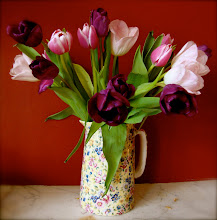Saturday 17 July 2010
French Vintage Enamelware
You don't realise how useful this stuff is until you find yourself in the garden or kitchen, needing something to put water in, hold freshly picked raspberries or wash out potatoes. You reach out, and there it is, a bit battered and chipped but honestly ready to do you a service.
The enamelled jug, or plate or pot has an innocence to it, an unpretentious cheerfulness as it knocks about and fits in with your life.
The simplicity of design that you find in many of the French vintage enamelware is the key to its value. This pitcher, or ewer, is aesthetically an ideal. The line of the handle, long and curved, not only adds to the beauty of the piece but when you pick it up to pour, it's perfect. You tilt, and the water pours out, steadily and generously. The effort required, on your part, is minimal; engineered loveliness gets the job done. And, as always with any object that has had many owners, you find yourself wondering who they were and how their life-story might have gone.
A lot our cookware nowadays is coated with Tefal or other toughened finishes. Most of what's available comes in black or brushed steel. It looks very 'smart urban' and easy to clean but none of it has the charm of multi-coloured enamelware.
The process of enamelling has been with us for centuries and is not unlike the way glass is made. Salts, metal oxides, clay and water are used to make enamel which is then heated to a very high temperature until the mixture becomes liquid. Then it can be applied to almost any metal object.
Enamel is strong, conducts heat very well and is stain resistant. Over a very long period of time though, it will corrode if used to boil water or acidic liquids.
You can see this in many of the vintage enamel jugs, pans and platters we have for sale but this ageing process only adds to their charm. You can of course, buy enamel paint to repair chips and cracks but who would want to. You'd only be rubbing out a piece of history.
Subscribe to:
Posts (Atom)





